It is The War to End All Wars, and Ena Connelly, a keenly sensory and extraordinary woman, is newly married and living on an Ontario farm. The shock of violence in far-off battlefields is echoed in a terror much closer to hand. With bold perception and remarkable self-reliance, Ena faces a dramatically altered world. Ena is self-contained, and careful not to reach too far into the turbulent emotional lives of others. As the war progresses, Ena forms a fierce bond of loyalty for Blain, the delightful but (necessarily) duplicitous boy who comes to work for her. Through Blain, she learns to extend herself in unexpected ways— to reach outside of herself, and to risk. Ena also grows closer to her sister-in-law, Sarah, a gifted painter. Sarah is unafraid of confronting emotional turmoil and passion but she doesn’t have Ena’s absolute clarity of purpose and aim. Ena helps Sarah move closer to the life she wants, while Sarah opens Ena to a terrible and essential kind of beauty. When studying Sarah’s paintings, Ena comments that it is not the surface that matters, but rather what is underneath. The same is true of this novel — underneath the meticulous detail of daily life is the emotional landscape of persistent, courageous women, watching the violence of war in Europe (World War I) and domestic violence closer to home.
“The Land’s Long Reach presents a vivid, engaging portrait of Bruce Peninsula farm life during World War I, when “the old conventions have been shattered.” So much has been written about soldiers’ wartime experience; this moving novel includes women’s perspectives in an era when our national identity was being shaped. A century later, their struggle is as timely as it is historical.”
—Penn Kemp, author of Local Heroes and Fox Haunts
“While most literature set in the period of World War I focuses on the horrors facing soldiers in the trenches, Valerie Mills-Milde’s beautiful novel explores the hardships confronting the men and women who must stay behind. Using memorable images, she explores the life of Ena, a farm-woman who faces violence and tyranny on the home-front. Though Ena’s grief is, as the author says, “a private tidal sea,” she surmounts it with courage, knowing that it’s the “long, sure reach of the land” she loves that will ultimately save her. Valerie Mills-Milde’s mastery of character and language is unforgettable.”
—Ann Birch, author of The Secret Life of Roberta Greaves

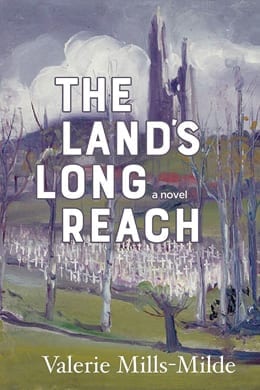
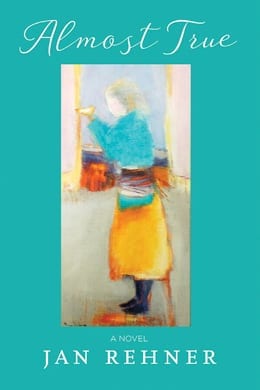

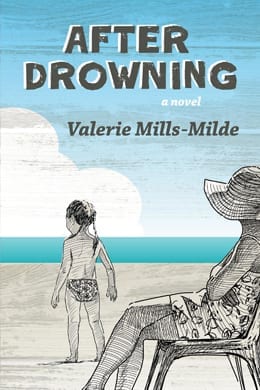

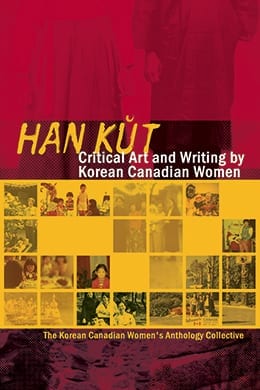
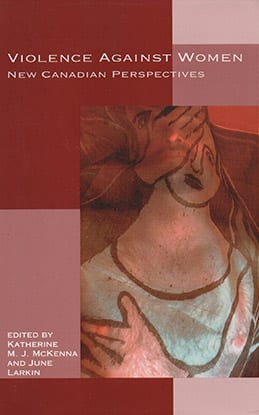
Renée Knapp –
The Land’s Long Reach by Valerie Mills-Milde
reviewed by Aaron Schneider
The Temz Review – February 5, 2019
https://www.thetemzreview.com/schneider-mills-milde.html
I should start with an observation that is also a bit of an admission, although not a qualification: I am in some ways an ideal reader for this book. I was born and raised in Bruce County, twenty minutes north of Owen Sound, and, for a while now, I have nurtured a fairly nerdy interest in the history of the region. Set in Owen Sound and the farms outside of it during the First Wold War, Valerie Mills-Milde’s second novel, The Land’s Long Reach, takes place in a time and location that I am intimately familiar with. When Mills-Milde describes the house on 7th Street in which the protagonist’s mother lives, I wonder which house, sort through my memories of the town, and maybe, I’ll admit it, pull up Google Maps to refresh those memories. When she writes about Harry Stewart, “a farm lad from Kemble,” who runs off to join the army at the start of the war, I wonder if she has invented the name or lifted it out of a history, a newspaper or a military document, and I pull out my copy of Beautiful Stoney Keppel, a history of the first hundred years of the township in which Kemble is located, to see if I can find Harry’s real-world counterpart in the pictures of the soldiers who enlisted. Although this book feels very close to me, and that is one of the reasons I like it so much, don’t get the wrong impression: it is not just a book for devotees of the history of Bruce-Grey. It is a deft and accomplished novel that contains a very rare mixture of empathy and clear-eyed, unsentimental precision in its understanding of its setting, its characters, and the violence that is at its story’s core. It is, in short, a book that will reward anyone who picks it up.
The novel follows a pair of couples from the spring of 1914, a few months before the start of the First World War, to the spring of 1918, half a year before its end. Ena, a baker, is married to Jamie, and they live on and work a farm that is part of Jamie’s family’s large holdings outside of Owen Sound. Jamie’s brother Hugh is the more ambitious and successful of the two, and his wife, Sarah, an aspiring artist, completes the tetrad. When the war arrives, Jamie eventually enlists. Although Hugh is the older and the stronger brother, he can’t join up because of a travelling eye. While Jamie serves in Europe, Ena works to keep their farm running, and Hugh prospers, buying up farms left vacant by dead soldiers. Jamie eventually returns, shell shocked with lungs damaged by gas, and dies back home in Owen Sound. Folded into the narrative of the war, and of the lives that were lived out at home by those who watched the soldiers leave, is a story of domestic abuse, and the way it shapes, deforms and destroys people.
Blain is a teenager who enters Ena’s life as one of Hugh’s hired men, and then, when Jamie is shipped out to the front, he helps her keep up her and Jamie’s farm. Blain’s mother is dead, and his father is the local bootlegger. He controls his son, confiscates his wages, and responds to the barest of slights, real or imagined, with sudden and brutal violence. This may seem like a bit of an obvious setup, a juxtaposition of the war abroad with the war at home, the catastrophe of the war and the violence ingrained in the society that produced it, but one of the pleasures of this book is the way that it evades these types of easy clichés and avoids reducing abuse to a symbol or a trope.
This is most obvious in Mills-Milde’s handling of character. The ability to realize a wide range of characters in the difficult fullness of their complexity has always been one of her strengths as a writer. And when I write “wide range,” I do want to stress the breadth of characters she is capable of imagining. In her first novel, After Drowning, she paired a graduate student in her thirties who is working on a PhD while raising her daughter with an aging biker who masterminds a massacre partway through the novel. It would be difficult to come up with a more unlikely pairing, but it works because both of the characters work, because they both emerge as complex, nuanced, real. And the same impressive grasp of personality and psychology underpins The Land’s Long Reach.
What this means in practice is that Mills-Milde is capable of profound empathy, but that that empathy is as much alive to the weaknesses of her characters, to their flaws and blemishes, as to their more sympathetic dimensions. For example, when Ena finds out that Blain’s father beats him, discovering him bloodied on her front step, Mills-Milde writes:
her mind is on the mess that is Blain’s scalp. A slight queasiness vanishes almost before it is felt, and what is left is a vibration, distant and rumbling—a disturbance, both angry and appalled.
What makes this passage fascinating is that Ena’s anger is not only directed at Blain’s father:
The fiery feeling has completely taken hold [of Ena]. She shouldn’t be angry with Blain, but she is. She bites her lip before speaking—teeth hard against her lip.
What Mills-Milde is describing is a common, but ugly response—displacing anger at an incidence of violence onto the person directly in front of us, onto the victim of that violence. It is a reflex that many of us have, and few of us want to admit, because we worry that it, rather than how we manage it, defines us. Documenting this response in a protagonist, particularly a female protagonist who readers will expect to be caring and nurturing, is a risk. But it is a risk that is worth taking because it allows Mills-Milde to explore the difficult humanity of her characters.
All of the characters in the book have this kind of complexity, but it is, perhaps, most notable in Blain, the victim of much of the violence in the novel. It would be easy to cast him in one of the conventional molds of the victim, as an easy object of sympathy. Instead, Blain is mercurial, by turns likable, sympathetic, frustrating, irresponsible. He is very much the adolescent, and, more importantly, he is marked by the ugliness that abuse produces in its victims. He is, at times, a difficult young man to like. Hugh doesn’t like him, and Ena sometimes struggles to like him, even after she realizes that he is being abused. He plays a role in the climax of the book in which Jamie dies, and Mills-Milde’s handling of this is as balanced and realistic as her treatment of him as a character, making him complicit in Jamie’s death without making him culpable of it.
The same complexity and resistance of conventional narratives is present in Mills-Milde’s treatment of Ena and Sarah’s friendship. Sarah is a painter who learned her craft at OSCVI, Owen Sound’s first high school, and continues to paint despite her husband, Hugh, not understanding or approving of art. She begins to work in secret with a male artist who is visiting the area, taking her new car to a studio they share up the peninsula without telling Hugh. At one point, Ena sees Sarah and the artist in Owen Sound, and there is a suggestion that they are having an affair. This is a pretty straightforward setup for one of the most obvious kinds of love triangles: a married woman who aspires to more than her narrow life is trapped between a husband who doesn’t understand her and a lover who is offering her the possibility of realizing her fuller self. The novel, however, never goes beyond this suggestion, refusing the convention that would define Sarah by positioning her between two poles of male desire, and, instead, exploring how her development as an artist influences her friendship with Ena. Sarah’s aspirations and growing accomplishments are played off of Ena’s increasing independence as she learns to manage the farm on her own, and begins to build a thriving business as a baker. The same refreshing rejection of obvious conventions defines Mills-Milde’s approach to historical fiction.
There are historical novels that fall into the trap of simplification and sentimentalisation, that paint the past in sepia tones, which is to say, in black and white with some brown thrown in for effect. This is not one of those novels. Its understanding of early 20th century Canada is rich and nuanced, and never reductive. It recognizes the misogyny that defines the society in which it is set, but also the ways in which women could and did achieve degrees of autonomy, and likewise the ways in the which the men in their lives would both limit and support that autonomy. It has a clear sense of how Owen Sound is removed from the metropole, but also that it is not wholly isolated, that Toronto is a train ride away, and that, for example, Ena can aspire, with effort and practice, to matching the pastries she is served in the best restaurants there. The Land’s Long Reach offers us the past in full colour, the past, not as an escape from or a reassuring simplification of the complexities of the current day, but as a place that we could have lived, not because it is the same as the present, but because it is as real as the present.
This review would not be complete without mentioning the quality of Mills-Milde’s writing. There is an impressive lucidity and precision to her prose that fills even quotidian moments with insight. Take, for example, this passage about Ena getting ready to plant her garden for the first time:
What she wanted was to enter into the puzzle of the garden on her own. She’d applied all the strength she had into preparing the plot, and after it was done, her body was alive with pain, her back throbbing, her calves tight.
Figuring the garden as a “puzzle” neatly captures the satisfying challenge the country presents to the Owen Sound-raised Ena. The unexpected “applied” foregrounds the purposive quality of her effort. And “alive with pain” speaks to the both the physical realities of the work and fulfilment Ena finds in it. Indeed, some of the most memorable passages in the book are about her connection to the land that she works first with Jamie and then on her own:
Ena lets the earth fall through her open fingers. The sensation of it leaving her causes a ruffling in her chest, a strange weightlessness and she puts both palms down against the feel, the heels of her hands pressed deeply, assuredly, into the cold ground. She pushed herself up to stand.
I have written about the complexity of Mills-Milde’s characters, and some of this is due to the care with which she crafts her sentences, and the quiet revelations they so often offer.
I began by saying that I am, in some ways, an ideal reader for this book, but that is perhaps not the best way to frame The Land’s Long Reach. It is deeply rooted in Grey and Bruce Counties, and it will be a pleasure to read for anyone with a connection to that area, but it is also a book that will reward anyone, regardless of their connection to the region, who spends time with its richly detailed characters and deftly crafted prose.